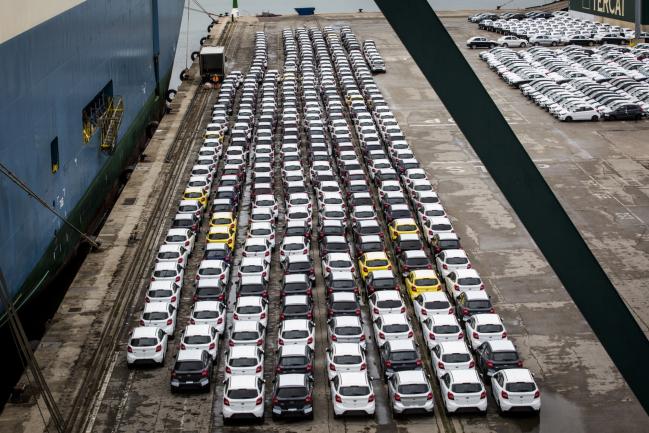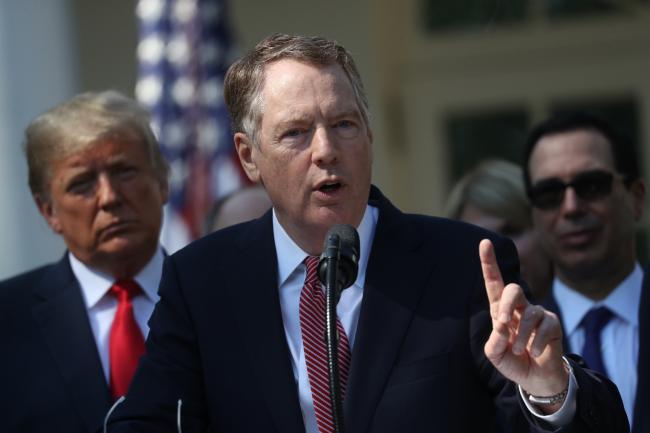(Bloomberg) -- President Donald Trump raised the prospect of slapping a 25 percent tariff on imported cars and ordered a review of China’s retaliatory auto tariffs against the U.S. as his administration continued to scramble to respond to General Motors Co (NYSE:GM).’s announcement of plant closures this week.
In a pair of Twitter posts on Wednesday, Trump pointed to a longstanding U.S. tariff on imported pickup trucks that has helped U.S.-based automakers dominate that market. He argued that a similar import tax on cars would have prevented GM’s move to close plants in the U.S.
“The reason that the small truck business in the U.S. is such a go-to favorite is that, for many years, tariffs of 25% have been put on small trucks coming into our country. It is called the ‘chicken tax,”’ Trump said on Twitter Wednesday.
A 25 percent duty on imported light trucks was applied in the 1960s by President Lyndon Johnson in retaliation to West German tariffs on U.S. poultry. Other products were included in those American levies initially but have since been eliminated. The pickup tariff, which also applies to work vans, has remained and has been a major contributor to U.S.-automaker dominance in the domestic pickup market.
More cars would be assembled in the U.S. if the same tariff were applied on imported autos, Trump said, adding in a second tweet that “G.M. would not be closing their plants in Ohio, Michigan & Maryland.”
Later in the day U.S. Trade Representative Robert Lighthizer announced that Trump had ordered a separate review of China’s 40 percent tariff on auto imports from the U.S., 25 percentage points of which is the result of Chinese retaliation against Trump’s own tariffs on imports from China. The U.S. currently charges a 27.5 percent tax on imported cars from China.
“As the president has repeatedly noted, China’s aggressive, state-directed industrial policies are causing severe harm to U.S. workers and manufacturers,” Lighthizer said. “China’s policies are especially egregious with respect to automobile tariffs.”
Lighthizer said Trump had directed him to "examine all available tools to equalize the tariffs applied to automobiles.”
The move comes just days before Trump is due to sit down for dinner with China’s Xi Jinping on the sidelines of a Group of 20 summit in Buenos Aires and some analysts said it appeared to be related to that. The U.S. had a trade surplus in cars with China last year. According to Kristin Dziczek of the Center for Automotive Research, the U.S. exported around 260,000 light vehicles to China in 2017 and imported about 60,000.
But it also comes as Trump is pondering broader actions on cars that threaten to hit key allies in the European Union and Japan.
Trump’s administration is mulling whether to apply fresh tariffs on imported autos under national-security grounds, as it did on steel and aluminum imports this year. The main targets of such a move would be cars from the EU, Japan and South Korea.
Some administration officials have been arguing that hitting allies such as the EU and Japan with tariffs at the same time as Trump is soliciting their help in taking on China would be counter-productive. The EU and Japan, in particular, have also drawn promises from Trump that he would not proceed with the auto tariffs as long as they are engaged in trade negotiations that are due to get underway in earnest early next year.
Nafta 2.0
Meanwhile, Canada and Mexico, two other major sources of U.S. auto imports, are set to be exempted from any tariffs as a result of the new version of the North American Free Trade Agreement negotiated by Trump.
Administration officials have been putting the final touches on a report laying out the conclusions of a Commerce Department study of auto imports that has to be presented to Trump by February. Once the report is submitted formally to him, Trump would have 90 days to take action.
Automakers, dealers and suppliers have come out against any new tariffs, arguing that they would hurt even U.S.-based companies and the U.S.’s international competitiveness. GM, which attributed its move this week to changing consumer tastes and declining sales, has said that the tariffs on steel and aluminum had already cost it $1 billion in profits.
Economists are also worried about the broader consequences for what would be a major escalation in Trump’s trade wars. U.S. imports of new passenger vehicles and parts were worth more than $340 billion last year.
The International Monetary Fund warned on Wednesday that the auto tariffs represented a major risk to the global economy. If the U.S. went ahead with auto duties and its trading partners responded in kind, it would take as much as three quarters of a percentage point off of global output, which IMF economists now expect to grow 3.7 percent next year.
(Updates with China tariffs review from sixth paragraph.)

